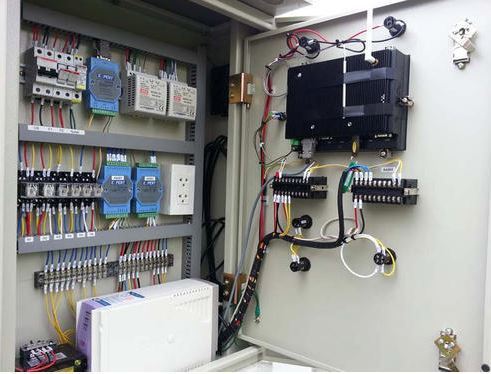Process Equipment Control Wired /Wireless
Why Wireless I/O?
Many companies have geographically scattered
assets, so they need sensor data at a central point. In the past, the only
available option included digging trenches or running conduit and pulling wire
to acquire the signals. Today, many wireless I/O applications offer simple,
cost-effective measurement of monitoring points to eliminate manually
collecting field data, thereby improving labor productivity.
In more
sophisticated applications, wireless I/O enables users to extract full
diagnostic data and predictive intel-ligence from the devices that will
automatically notify the appropriate personnel of the precise problem before a
costly asset, unit or plant shutdown occurs.
Foundation of Wireless
I/O and I/O Expansion
The foundation of wireless I/O and I/O expansion
is license-free 900MHz spread spectrum radio technology designed specifically
for integration into remote assets and SCADA systems. This technology has been
used reliably in field automation for almost 20 years.
Frequency Hopping
Spread Spectrum (FHSS) uses pseudo-random hopping patterns that are proprietary
to the radio manufacturer, making industrial FHSS radios inherently secure and
less prone to interference. This makes FHSS the preferable choice for
industrial wireless I/O applications, such as simple analog and digital
signals.
Advantages Compared to Wired Options
In addition to the labor
and material costs associated with hard-wiring instrumentation, one of the
other advantages is deployment speed. Wired systems can take days or weeks to
be installed, isolated and commis-sioned. Wireless I/O networks generally
require only the end points to be installed an`d configured, saving substantial
time for projects with aggressive schedules.
In the event of a communication
failure, communi-cation link alarms let the user know if a loss of signal
between an I/O slave and the I/O master is halting data transfer from the
instrument. The I/O slave will control its outputs based on the fail-safe
default condition that was pre-programmed in the radio during system
configuration.
Wireless I/O Expansion
Scalability is the next biggest
advantage of wireless I/O compared to hard-wired alternatives. Some I/O
expansion solutions allow users to expand their wireless I/O capabil-ity by
adding expansion modules.
Each expansion module allows for 12 additional I/O
points. Up to 15 modules can be stacked and snapped onto a base radio module.
This allows for a scalable solution of up to 192 I/O points per remote location
via Modbus from the master radio into the PLC. Each I/O slave is given a unique
Modbus device ID, and the PLC is configured to poll Modbus registers of the
specific Mod-bus address for each slave device.
Wired I/O
Expansion
While the I/O expansion module offers great utility when
stacked on a radio module, it also can be deployed without a radio on an I/O
expansion base module. This is useful for applications in which the PLC has
limited I/O capacity.
The expansion stack starts with a PC module directly
connected to the PLC via the serial port. It’s Modbus addressable, as is the
radio module. Users can add more I/O expansion modules to meet the I/O count
required for the application. This offers a cost-effective, scalable solution
for bringing in additional I/O points to the controller system with minimal
programming and setup.
Reliability
Wireless systems must be just as reliable as
traditional copper wire. Corrupted data can result in anything from a
disruptive glitch to a devastating failure.
To identify and ultimately
maximize signal reliability, users should perform a radio-frequency (RF) site
survey or path study. Also, use a comprehensive software package that will
allow for system configuration and diagnostic monitoring of signal
reliability
- Minimum Order Quantity: 1 No(s)
Why Wireless I/O?
Many companies have geographically scattered
assets, so they need sensor data at a central point. In the past, the only
available option included digging trenches or running conduit and pulling wire
to acquire the
...
Read more
